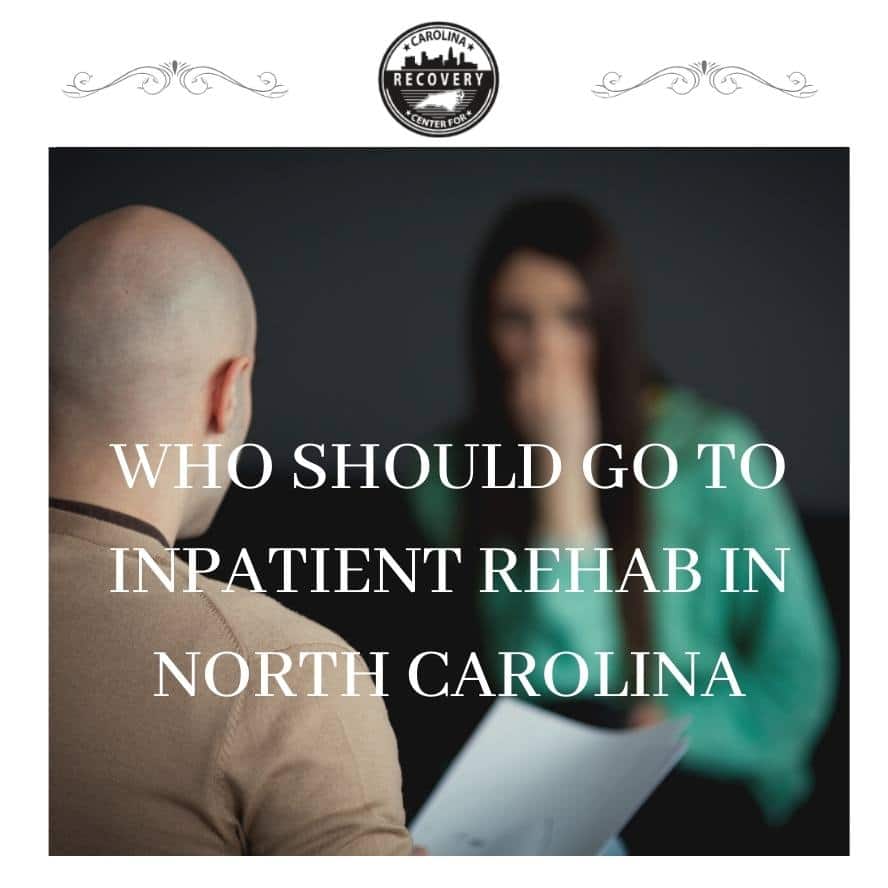Who Should Go To Inpatient Rehab in North Carolina?

Medically Verified: 2/1/24
Medical Reviewer
Chief Editor

All of the information on this page has been reviewed and verified by a certified addiction professional.
Searching for the right North Carolina rehab program can be confusing. With so much new terminology out there, between “PHP,” “IOP,” “residential,” and more, it can be difficult to know what type of person qualifies for which type of program. Inpatient rehab is considered the highest level of care. These programs have medical and clinical teams on-site at all hours of the day. While some people may not need this intensive level of care, there are certain types of people who should absolutely choose an inpatient rehab in North Carolina.
People With Co-Occurring Health Conditions
According to the National Institute on Drug Abuse, over 60% of adolescents in substance abuse treatment programs and 50% of adults also met the diagnostic criteria for a mental health condition.[1] Since there are such high rates of comorbid mental illness and substance use disorder (SUD), dual diagnosis treatment programs have evolved to help meet the unique treatment needs of these individuals.
People who struggle with mental illness, such as anxiety, depression, bipolar disorder, and PTSD are not only at a higher risk for drug and alcohol use, but they also face additional obstacles in their journeys to sobriety that other people may not experience. Many people with mental illness may use substances to cope with their symptoms, and getting sober means having to find new ways to cope.
In the earliest days of recovery, individuals with co-occurring disorders may be highly susceptible to relapse due to their withdrawal symptoms and mental health condition. It takes time to learn how to cope and stay sober. Without 24/7 care and support, it can be easy for these individuals to slip back into old behaviors. Inpatient rehab is the best option for individuals struggling with co-occurring disorders in North Carolina.
People With a Chronic History of Relapse
There are many reasons why people relapse. Usually, relapses occur as a result of a variety of lifestyle changes or behavioral changes that are similar to those that a person had before getting sober. The inability to cope with things like anxiety, depression, stress, grief, loss, and mental health can make substance abuse seem desirable, however, these problems only get worse from one relapse to the next.
People who have a history of going to treatment, collecting some sober time, relapsing, and going back to treatment are often at a high risk of repeating this same pattern of relapse. Even though between 40-60% of people in recovery relapse at some point, so-called “chronic relapsers” can learn relapse prevention strategies that allow them to live sober.[2]
This type of patient will benefit the most from a highly structured and individualized clinical treatment program. In other words, an inpatient rehab with comprehensive care is best for people with a long history of relapse.
People Diagnosed With Severe Substance Use Disorder (SUD)
Substance use disorder (SUD) is diagnosed on a scale. Patients may be considered to have mild, moderate, or severe SUD.
If a patient is unsure whether or not inpatient rehab in North Carolina is the right choice for them, they should look at the 11 criteria outlined in the Diagnostic and Statistical Manual of Mental Disorders – Fifth Edition (DSM-V). These are the official criteria used by mental health practitioners to diagnose individuals with addictions.[3]
- Having unsuccessful attempts at quitting or scaling back drug use
- Developing a tolerance or need to use increasing amounts of a substance
- Experiencing withdrawal symptoms when sober
- Substance use is affecting work, home, school, or social life
- Continuing to use substances despite negative effects at work, home, school, or social life
- Continuing to use substances despite worsening mental health symptoms
- Spending excessive time thinking about substances
- Having cravings or urges to use a substance
- Loss of interest in hobbies or activities a person used to enjoy
- Taking substances more often or in larger amounts than intended
- Engaging in risky or dangerous behaviors and continuing to do so
Patients who meet 2-3 criteria are considered to have a mild SUD, while 4-5 indicate moderate SUD and 6 or more indicate a severe SUD. The more symptoms a patient can relate to, the more severe his or her addiction may be. And, anyone who experiences 6 or more symptoms should certainly consider a residential treatment program that can support their needs.
People Without Stable, Supportive, and Drug-Free Housing
Studies looking at sober living homes have found that the lack of stable, supportive, and drug and alcohol-free housing is a major barrier to people in recovery.[4] People who live in households where substance use is rampant or with people with whom they have toxic relationships may find that sustained abstinence is nearly impossible.
Inpatient drug and alcohol rehab in North Carolina removes patients from their usual environment and places them in safe, secure, sober, and supportive housing. During inpatient, behavioral health technicians are on-site around the clock to provide 24/7 monitoring and support. This fresh and healthy environment enables patients to focus more on their recovery and less on their substance use.
Find Out if Inpatient Rehab in North Carolina is Right For You Today
Anyone who has the desire and willingness to get sober may qualify for a residential drug and alcohol treatment program in North Carolina. Here at Carolina Center for Recovery, our family-owned and operated treatment facility aims to help you feel at home while facilitating life-long healing. If you or a loved one are ready to begin your road to recovery, give us a call. We can help you get started.
References:
- https://www.drugabuse.gov/publications/research-reports/common-comorbidities-substance-use-disorders/part-1-connection-between-substance-use-disorders-mental-illness
- https://www.drugabuse.gov/publications/drugs-brains-behavior-science-addiction/treatment-recovery
- https://www.ncbi.nlm.nih.gov/pmc/articles/PMC3767415/
- https://www.ncbi.nlm.nih.gov/pmc/articles/PMC3057870/

